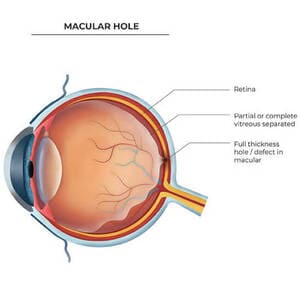Vitrectomy Surgery by top Retina Surgeons in Sikar
![]() Affordable
Affordable
![]() Same day discharge
Same day discharge
![]() MIVS (Micro-incision Vitrectomy)
MIVS (Micro-incision Vitrectomy)
![]() Free Consultation
Free Consultation
Vitrectomy Surgery In Sikar
If you are looking for a vitrectomy surgery that is both safe and effective, then you should consider Sikar as your destination. If you are experiencing blurred vision or other eye problems, vitrectomy surgery may be the right treatment for you. Vitrectomy is a procedure that removes damaged or infected portions of the eye’s vitreous humor, or jelly-like substance that fills the inside of the eye. This can cause various visual problems, and vitrectomy surgery is one of the most effective treatments for them.
Vitrectomy surgery is usually done as an outpatient procedure, and most people recover within a few days. Depending on the extent of the damage, you may need to wear an eye patch for a few weeks after the surgery. Most people report good vision post-vitrectomy, with no significant changes in their daily lives.

Why is Vitrectomy Surgery done?




Types of Vitrectomy
There are three main types of vitrectomy: pars plana vitrectomy (PPV), transconjunctival sutureless vitrectomy (TSV), and endoscopic subretinal or epiretinal approach.
Pars plana vitrectomy is the most common type of vitrectomy, and it is usually done using an endoscope. The surgeon uses a surgical saw to cut a hole in the front of the eye socket and then uses an endoscope to enter the eye. Once inside, the surgeon can see the macula and other areas of the retina.
Transconjunctival sutureless vitrectomy is another common type of vitrectomy. This procedure is done without surgery by using a thin bandage to hold open the eye while a suction device removes fluid from inside the eye.
Endoscopic subretinal or epiretinal approach is a less common type of vitrectomy that uses an instrument called an ESRF to enter through the eyesocket directly into the retina.
Vitrectomy Surgery Cost In Sikar
The cost of vitrectomy surgery in Sikar can vary depending on the type of surgery required. The cost of vitrectomy surgery in Sikar varies between ₹20,000 to ₹80,000. Anterior Vitrectomy in front portion of the eye costs around ₹24000. Simple posterior vitrectomy involves suction / removal of the vitreous gel or blood from the back portion of the eye and costs around ₹55,000. However, in certain cases, Endolaser is used to burn the bleeding retinal blood vessels. This increase the cost to ₹50000. Similarly, if the retinal detachment is high, the surgeon might use silicone oil or gas tamponade to temporary fill in the eye and settle the retina. This further increase the cost to ₹60000. Below is the average cost of different type of vitrectomy procedures:
| Treatment | Cost (₹) |
|---|---|
| Vitrectomy Anterior in Sikar | 24,000 |
| Simple Posterior Vitrectomy (Pars plana) with MIVS (micro incision vitrectomy) in Sikar | 55,000 |
| Vitrectomy (Pars plana) + Endolaser in Sikar | 45,000 |
| Vitreoretinal Surgery + Endolaser + Silicon Oil or Gas Tamponade in Sikar | 50,000 |
| Vitrectomy + Endolaser + Silicon Oil or Gas Tamponade + Scleral Buckling in Sikar | 70,000 |
| Lensectomy (Lens replacement) + Vitrectomy in Sikar | 50,000 |
| Complex Vitrectomy (23G) in Sikar | 60,000 |
Vitrectomy Hospitals in Sikar
There are several vitrectomy hospitals in Sikar, including MantraCare Sikar, Eye Clinic Sikar, Eye Center Sikar, and Eye Mantra Sikar. EyeMantra is one of Sikar’s leading vitrectomy treatment center, with over 100,000 eyes operated by its doctors. Our hospitals in Sikar are accessible from the following areas :
- Khatushyamji
- Palsana
- Ajeetgarh
- Piprali Road
- Sargoth
- Fatehpur
- Charan Singh Nagar
- Neem Ka Thana
- Anand Nagar
- Dhod Road
- Ranoli
- Mohalla Qureshi
- Radhakishanpura
- Vinayak vatika road
- Todinagar
- Mohalla Jamidaran
- Ambedkar Nagar
- Shivsinghpura
- Vasant Vihar
- Chandpura
- Salasar road
- Laxmangarh
- Kanwarpura
- Shahpura
- Ramgarh
- Bajaj Gram Sanwali
- Shrimadhopur
- Aloda
- Reengus
- Tilak Nagar
- Shastri Nagar
- Balaji Vihar
Top Vitrectomy Doctors in Sikar

Cataract, Retina, Glaucoma, LASIK

Retina Specialist

Cataract, Glaucoma

Cataract, Retina, Glaucoma
Happy Patients from Sikar after Vitrectomy

“I wanted to say thank you to the team at Mantracare for helping me get back my eyesight. The staff was so patient with me and I am glad that I called this place.”
– Rishi (Sikar)
Frequently Asked Questions
A vitrectomy is a surgical procedure in which the vitreous, or jelly-like substance that fills the inside of the eye, is removed. The vitreous is then replaced with either a salt solution or a gas bubble. In Sikar, EyeMantra offers one of the best facilities and surgeons for vitrectomy surgery.
Vitrectomy is generally a safe and effective surgery, but as with any type of surgery, there are potential risks involved. The most common risks associated with vitrectomy include:
- Bleeding: There is a small risk of bleeding during or after the surgery.
- Infection: There is also a small risk of developing an infection after the surgery. This can usually be treated with antibiotics.
- Retinal detachment: In some cases, the retina may become detached from the back of the eye after vitrectomy surgery.
- Vision loss: Although vision loss is rare, it is possible to lose some vision after vitrectomy surgery.
At MantraCare Sikar, Vitrectomy surgery starts from ₹20,000. The cost varies based on the procedures such as anterior vitrectomy (₹24,000), Pars Plana posterior vitrectomy (₹35000), Endolaser (₹50000) & lensectomy (₹50000)
The vitrectomy surgery at Mantracare Sikar is a safe procedure that takes around 1-2 hours. However, the length of the surgery can vary depending on the complexity of the case. You get discharged the same day.
MantraCare is one of the best hospital for vitrectomy in Sikar. They have top vitrectomy doctors with over 20,000+ satisfied clients. We perform Micro incision vitrectomy in which the cut size is minimal and healing is faster.